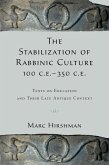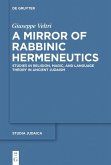This book examines the origins of communal and institutional almsgiving in rabbinic Judaism. It undertakes a close reading of foundational rabbinic texts (Mishnah, Tosefta, Tannaitic Midrashim) and places their discourses on organized giving in their second to third century CE contexts. Gregg E. Gardner finds that Tannaim promoted giving through the soup kitchen (tamhui) and charity fund (quppa), which enabled anonymous and collective support for the poor. This protected the dignity of the poor and provided an alternative to begging, which benefited the community as a whole - poor and non-poor alike. By contrast, later Jewish and Christian writings (from the fourth to fifth centuries) would see organized charity as a means to promote their own religious authority. This book contributes to the study of Jews and Judaism, history of religions, biblical studies, and ethics.
Dieser Download kann aus rechtlichen Gründen nur mit Rechnungsadresse in A, B, BG, CY, CZ, D, DK, EW, E, FIN, F, GR, HR, H, IRL, I, LT, L, LR, M, NL, PL, P, R, S, SLO, SK ausgeliefert werden.









